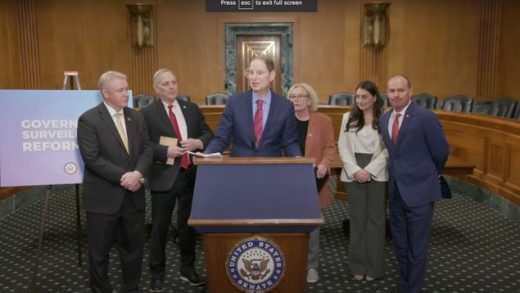Every school and public library has different policies and procedures surrounding book challenges, and the processes behind the way a book moves from challenge to banned or returned differs, too. This is why some institutions are much more likely to remove books than others — their policies are easy to maneuver or undermine if they have a policy at all.
One reason that a single woman in Elkhorn, Wisconsin, was able to get 444 books immediately pulled from the school district’s middle and high school was a poorly written policy. The policy changed one year prior, and it stated that a submitted book challenge form would lead to the immediate removal of a book while it was being evaluated by the school district administration. That right there gave carte blanche for submitting forms to get the books banned and overwhelm the district.
Moms For Liberty’s BookLooks has been a godsend for that group, similar to how RatedBooks has been such for No Left Turn in Education. These book review databases compiled by individuals with a lot of time and a lack of actual background in education, literacy, or libraries, are not based on any professional standards. They function as easy ways for book banners to submit the paperwork necessary to trigger book bans and review processes at schools and public libraries nationwide. That’s precisely what the book banner in Elkhorn did — she copied and pasted dozens of these “reviews” with her forms, doing little of the work herself to articulate her complaints. In schools across the country, this would be deemed academic dishonesty and cheating, with consequences for the student ranging from failing the assignment to being expelled from the institution.
For the adults doing it, though, it’s too frequently allowed books to be yanked from the hands of students.
Because people who don’t see these forms may not know what they look like once completed by the aggrieved, it seems worth highlighting a few examples. Certainly, it’s one thing to hear these concerned citizens offer up their moral panic as performances before school and library boards. But there is something especially egregious about seeing the lack of work or effort put into the forms they’re often required to fill out in order to trigger a formal review process. As you’ll see, the standards students are held to and the standards that institutional staff are held to are not those demanded of book banners.
These forms also show just how much the banners care about actual literature. “Bad author” or “damaged souls” is a meaningless critique and yet, it is being taken seriously again and again.
Hernando Public Schools (Florida)
In a recent school board meeting, many books were being reviewed as part of the formal process in the district. This board packet is enlightening — the example below is but one of the dozens in the packet from the local Moms For Liberty chapter. They’ve copied and pasted their own “reviews” with their complaints, and as is seen in several of the complaints, they’ve lied about the age appropriateness of the books.
Take, for example, Cory McCarthy’s Man ‘o War.
|
|
“The book clearly shows a warning label for 18 years of age and up” is a flat-out false statement. You know where that “warning label” is? If your guess is on Moms For Liberty’s BookLooks website — again, not a professional review source — then you’d be right.
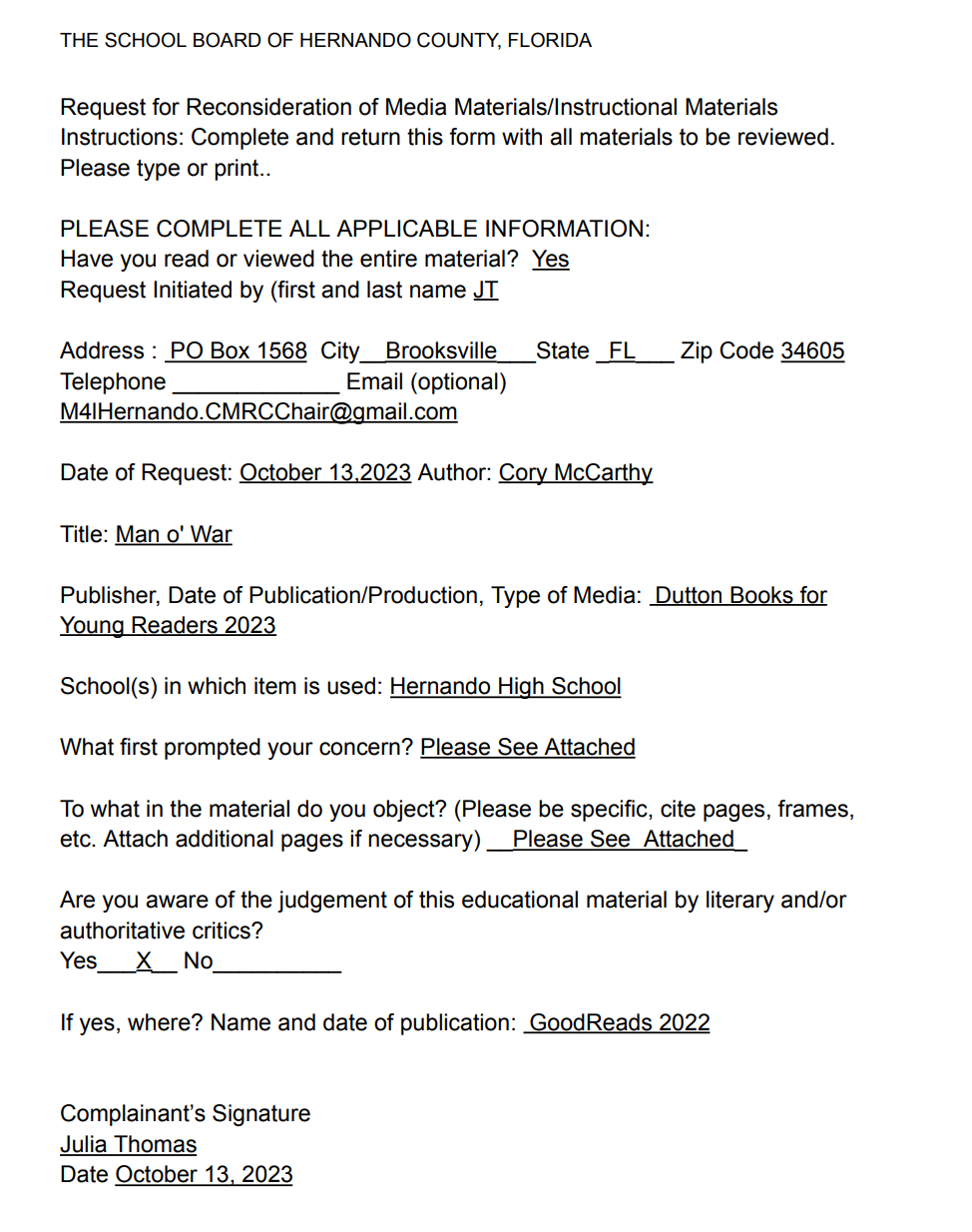 |
The complainant is aware of reviews by “literary and/or authoritative critics” and lists…Goodreads 2022 as that. Goodreads is neither literary nor authoritative critics. It’s a social media site for readers to rate and review books based on their personal interests and desires.
The “Please see attached” related to the concerns over the book is, you guessed it, copy-pasted from BookLooks. This is the first of ten pages from the BookLooks review, ending in a count of profanities, which I’ve included for funsies.
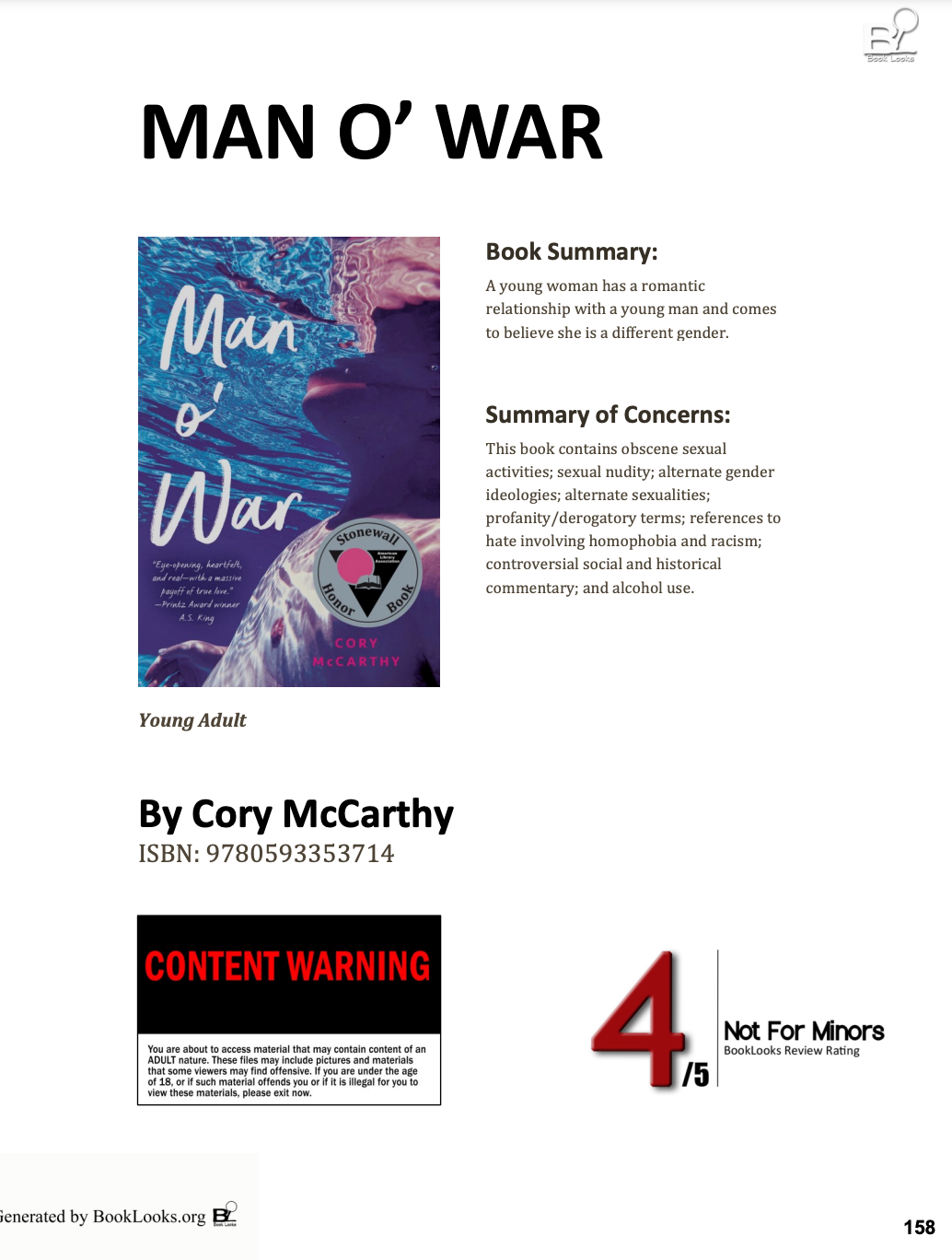 |
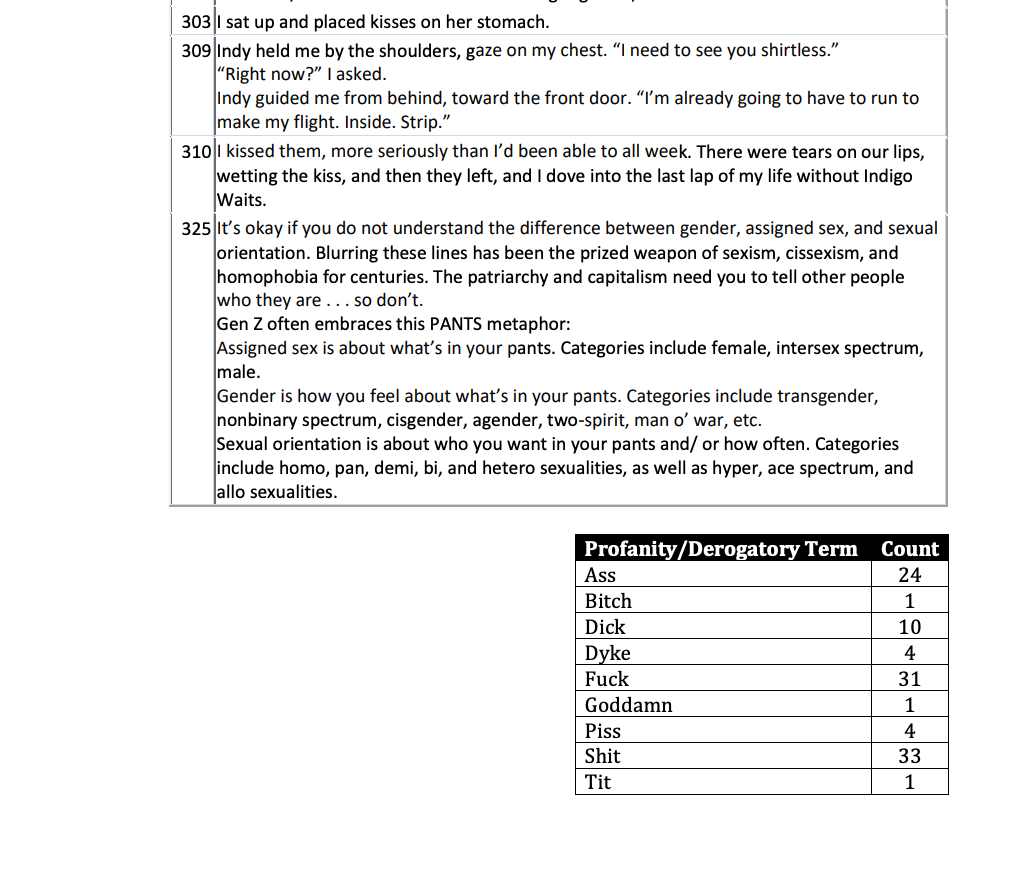 |
So not only did the complaint form lie about the age rating on the book, the board packet includes several actual professional reviews, including Kirkus’s glowing review and an additional starred trade review.
But in the end, the lies — and the homophobia and transphobia that actually underlie the complaint here — won. The book was removed after the board decided it was against the law.
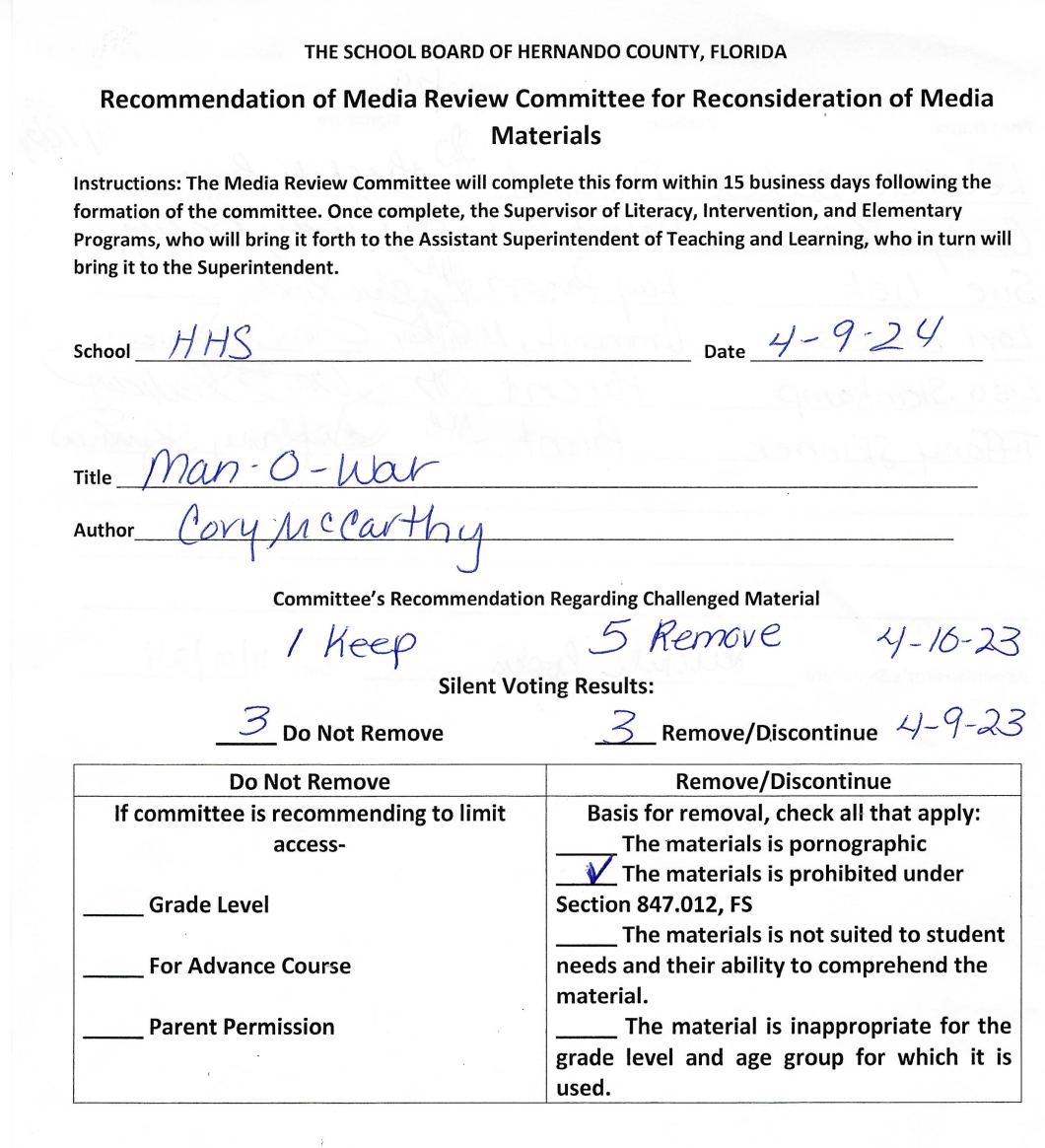 |
The above-linked packet is over 500 pages long, hundreds of which look exactly like this. They’re pages populated with lies about “age appropriateness” derived not from professional resources but from Mom’s own homegrown, agenda-driven database. Again, the complaints don’t even do their own work. They copy and paste.
Clay County District Schools (FL)
Clay County is home to Bruce Friedman, who is one of the most prolific–if not the most prolific–book banner in America right now. Bruce, who I’ve written about before, used my work here as a reason to then target my books in Clay County, where one of those titles was successfully removed.
Anyway, Bruce’s forms are even wilder than the ones in Hernando Count. Here’s one he submitted for 10 Things I Can See From Here by Carrie Mac, which he successfully got removed from the district. This is a 10-page long document, so I’m including only a couple of screenshots, but you can read the full complaint here (the bulk of it are photo-copied pages from the text with passages underlined). If you’re curious, scanning the QR codes takes you to his database of thousands of books he deems inappropriate.
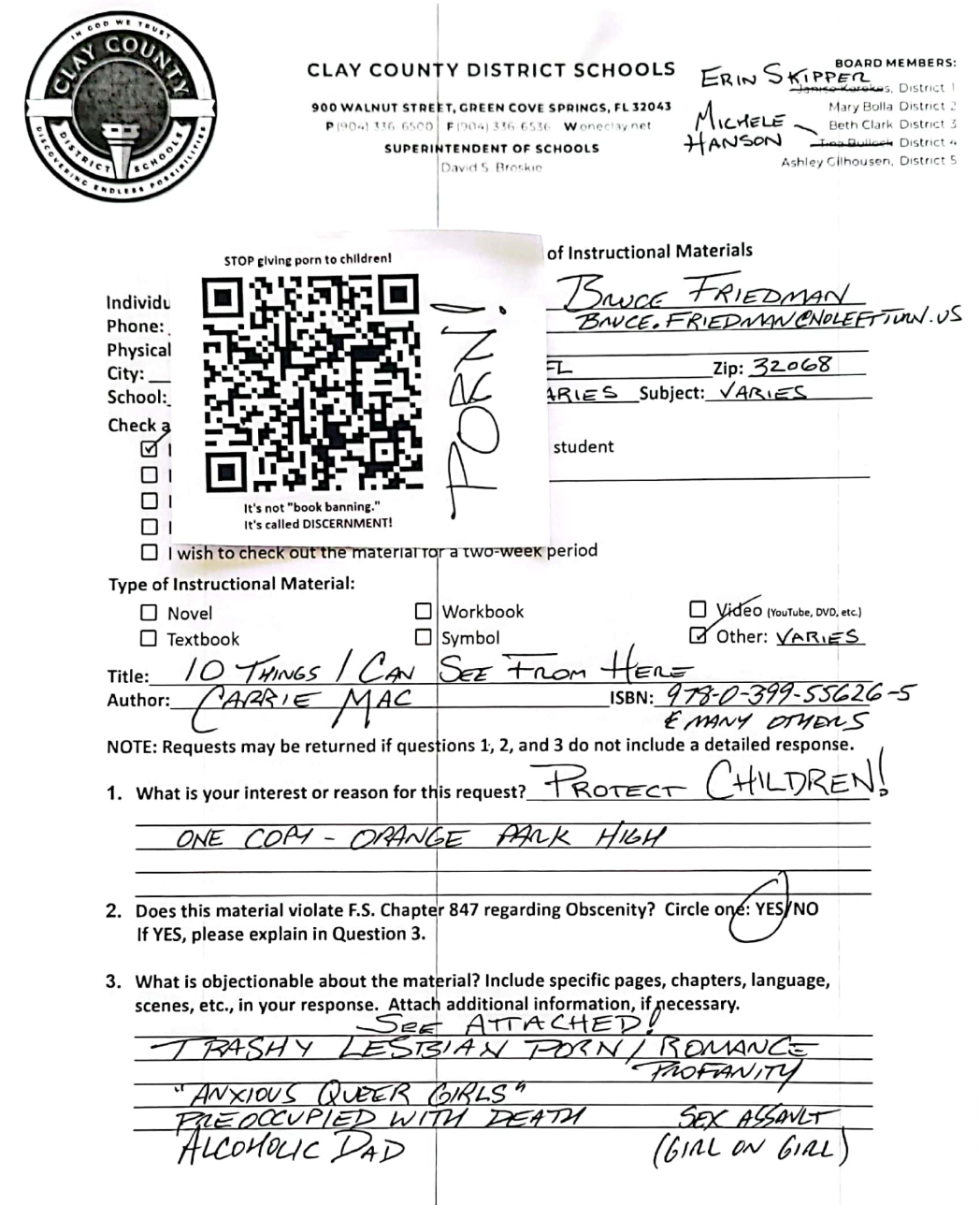 |
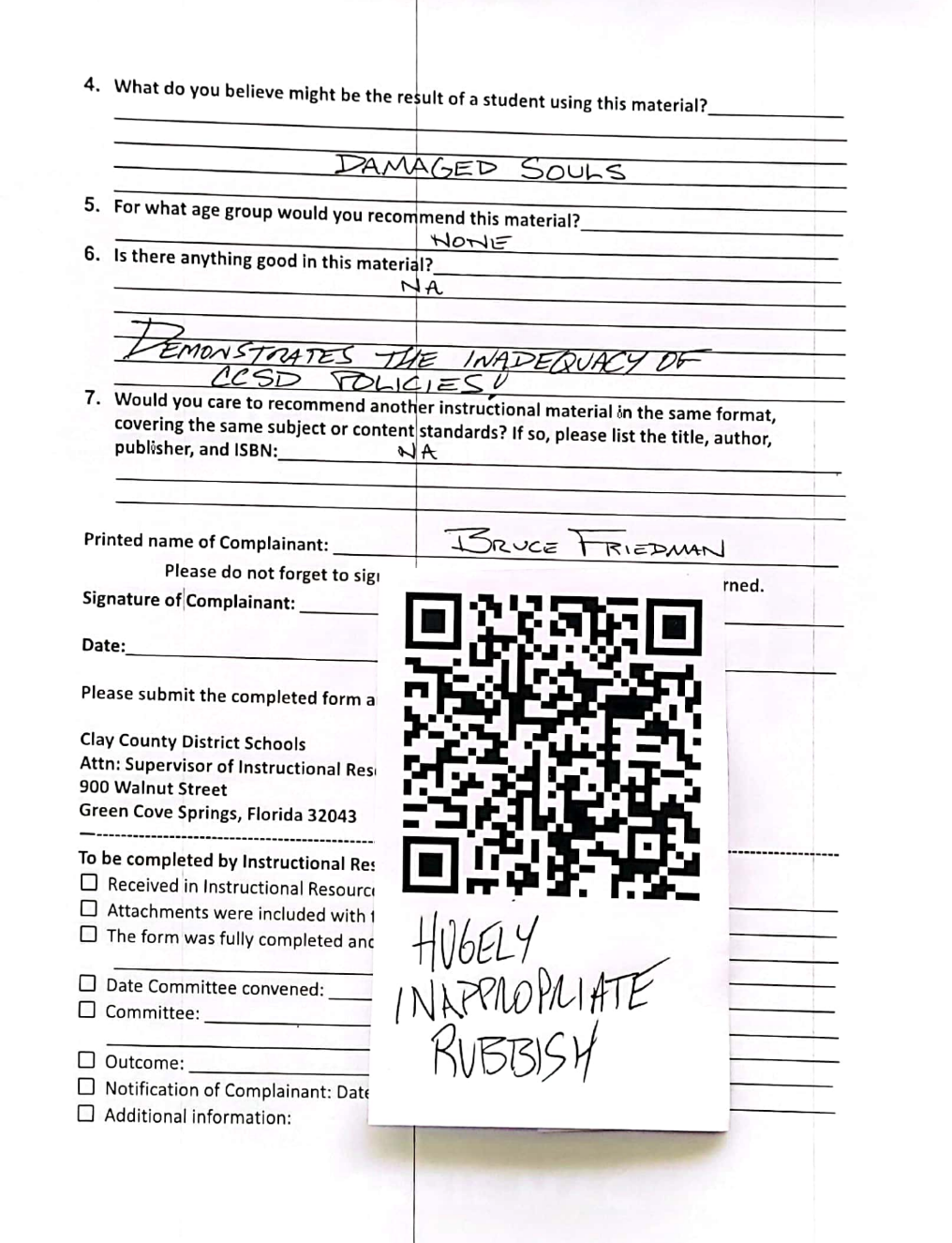 |
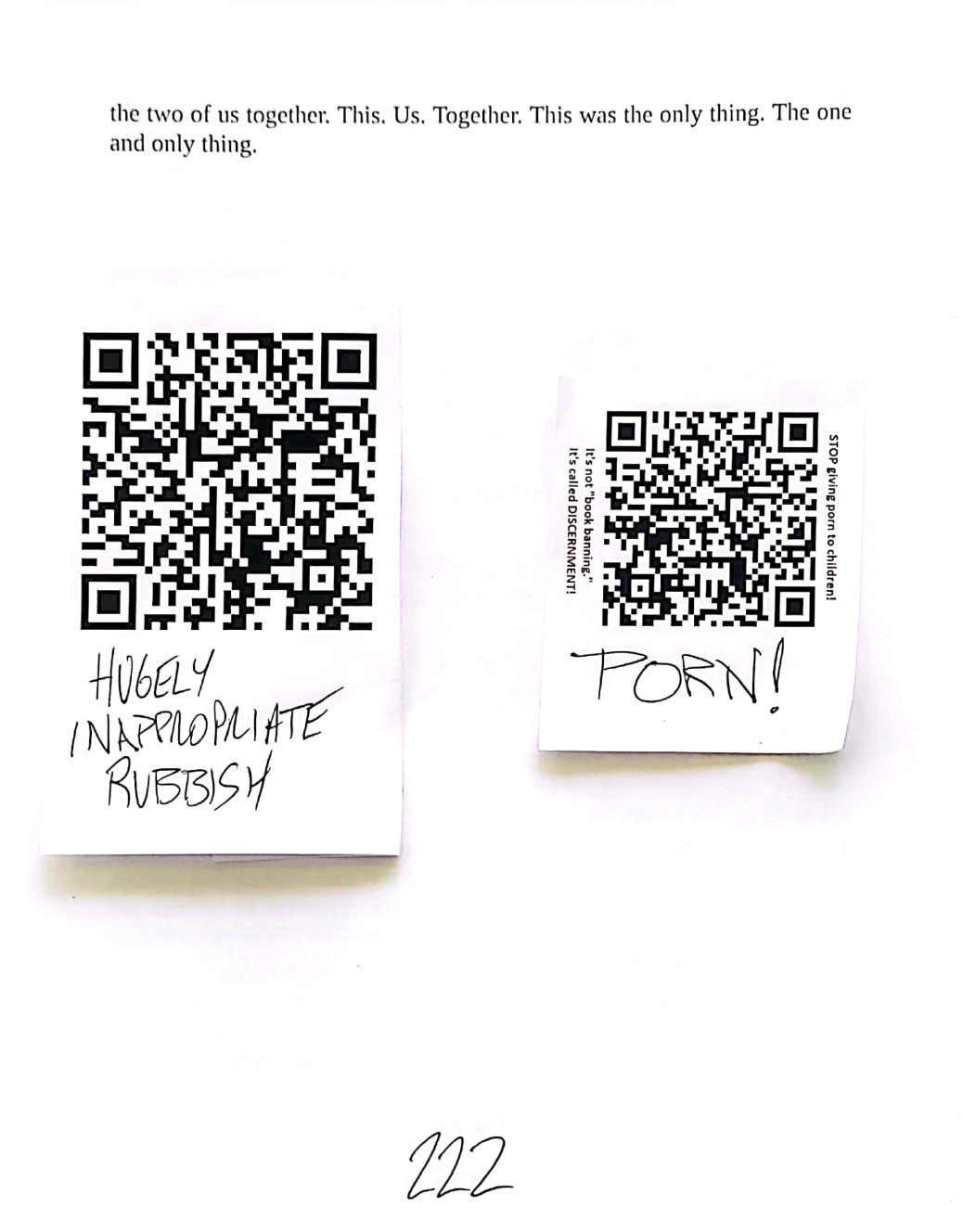 |
Here’s the first page of a similar complaint lodged against Someday by David Levithan in 2022. “Bad author.” Super useful or professional insight as to why a book should be banned and inaccessible to an entire body of students, faculty, and staff in a school district.
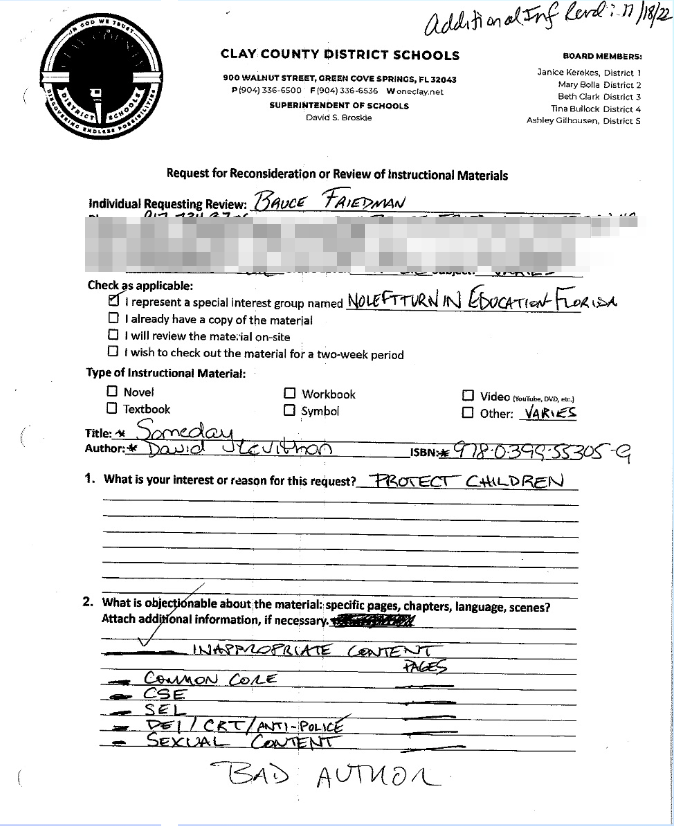 |
Wilton-Lyndeborough Cooperative Middle/High School (New Hampshire)
A member of this district school board found my book Body Talk to be offensive. The board split their vote on keeping it — and ultimately did — but here’s a look at the form that a school board member filled out as her complaint. It certainly offers a lot of insight into why the book is inappropriate for every single student in the school doesn’t it?
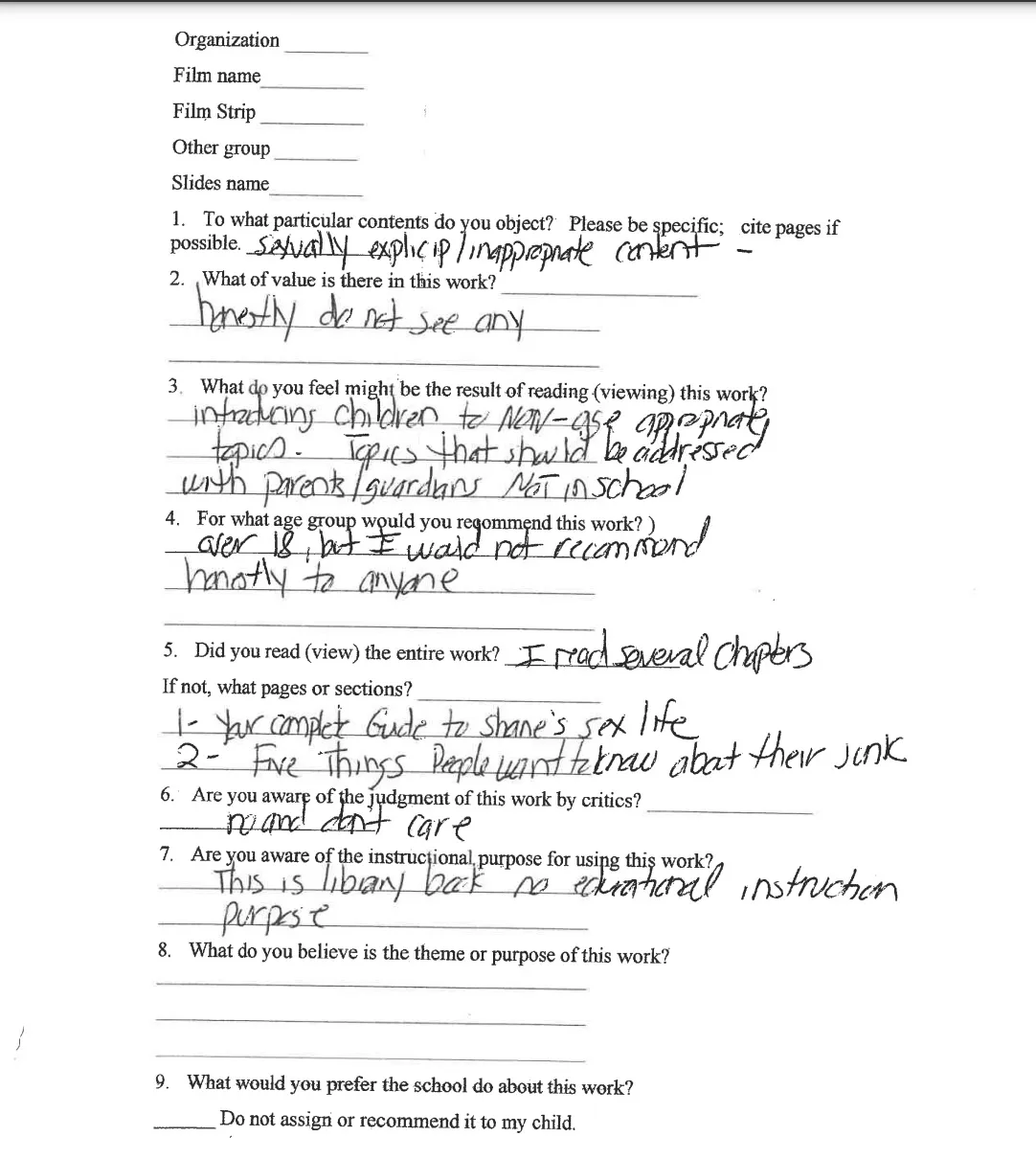 |
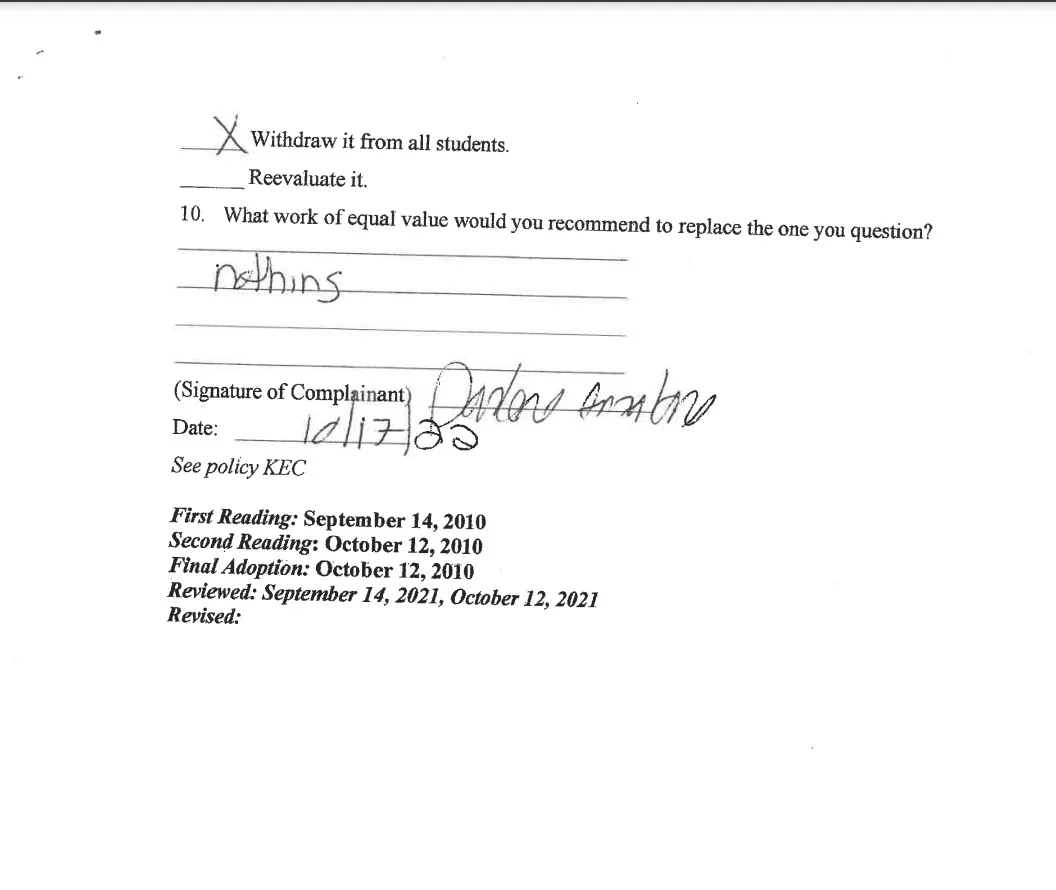 |
Not only does she offer absolutely no insight into why she believes the book should be inaccessible to the entire school, but she doesn’t even fill out the entire form. She can’t be bothered to consider the purpose of the book. She read several chapters, and that was enough for her.
Laurel School District (Montana)
The complaints for the books in this district at least offer a little more context in their written complaints. But you’ll be shocked to discover that they also play the “see attached” with pages from BookLooks. Note: while this is all public record because there is a personal address here for the complainant, I’ve elected to blur that out.
To give context of some of the handwritten notes on this one: the date at the top is the date it was reviewed by the board. The “spokesperson” language is about who showed up at public comment. You can read the full rundown of this book (and a couple other books!) in the board packet from February 2024, as it will also give insight into how each board member discussed the title. The Lesbiana’s Guide to Catholic School, below, was kept in the collection.
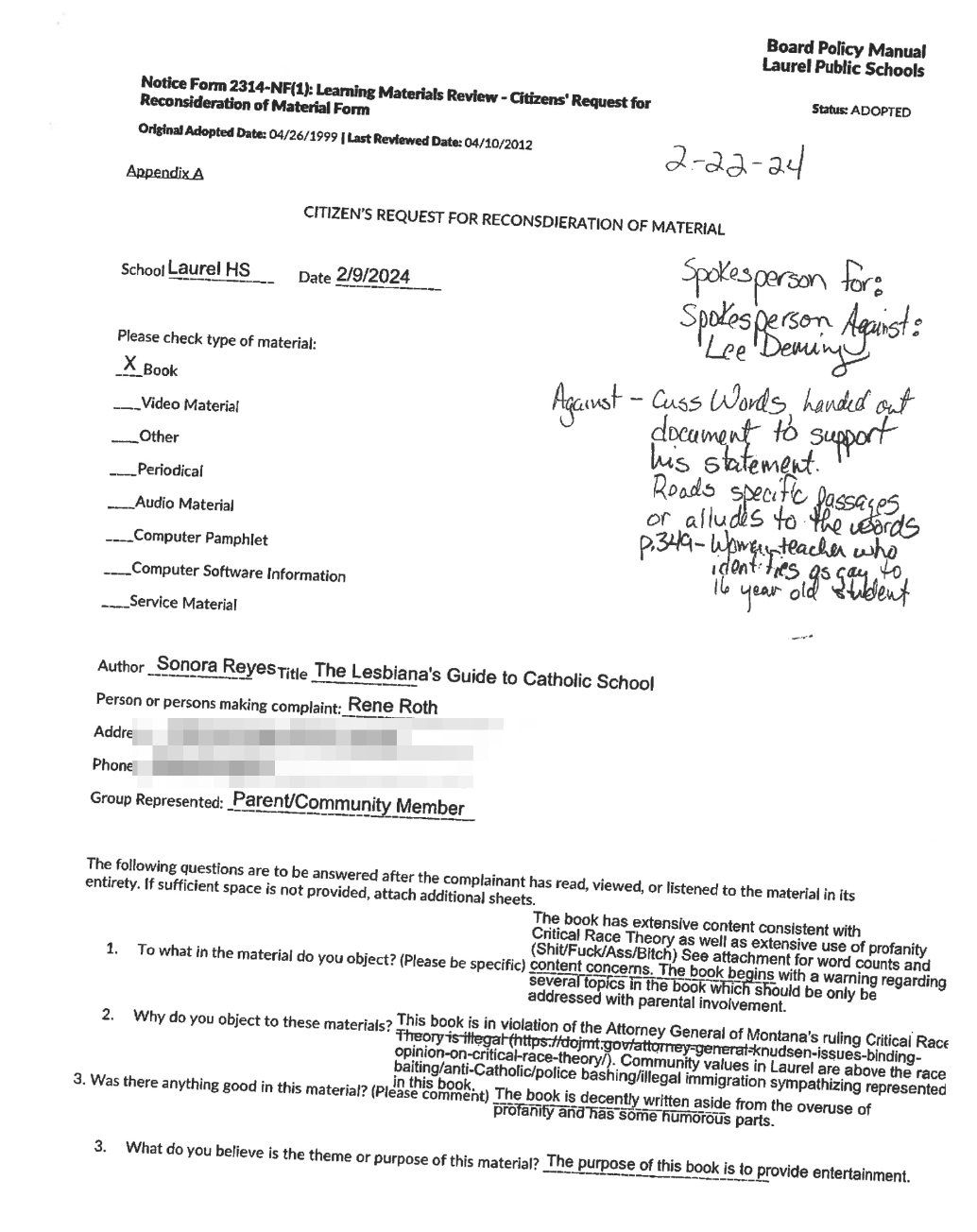 |
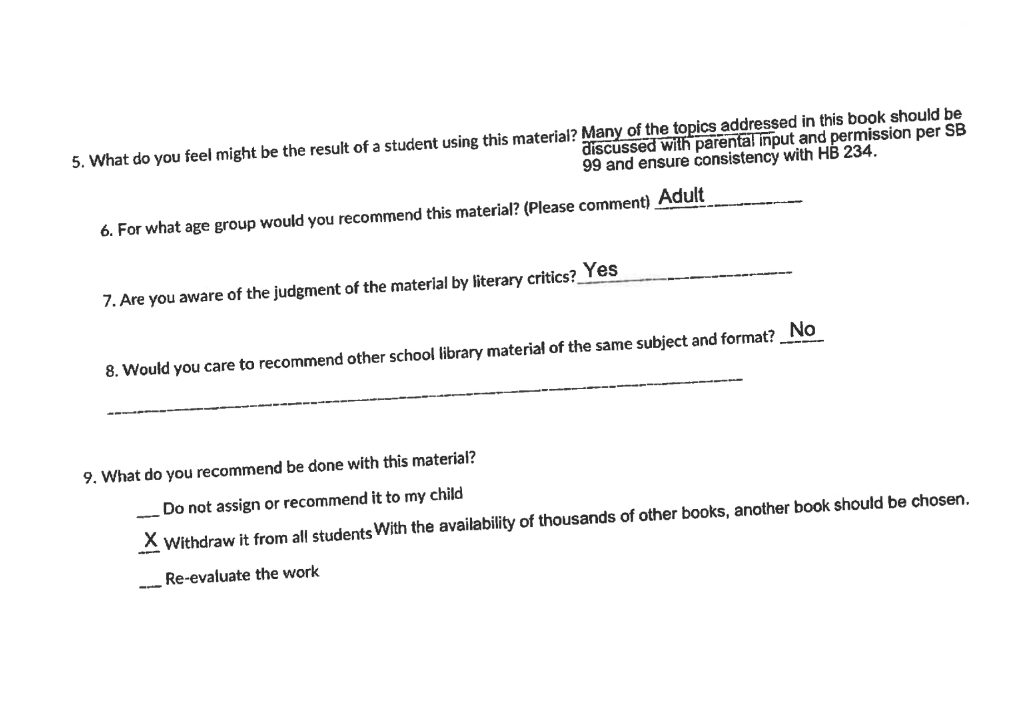 |
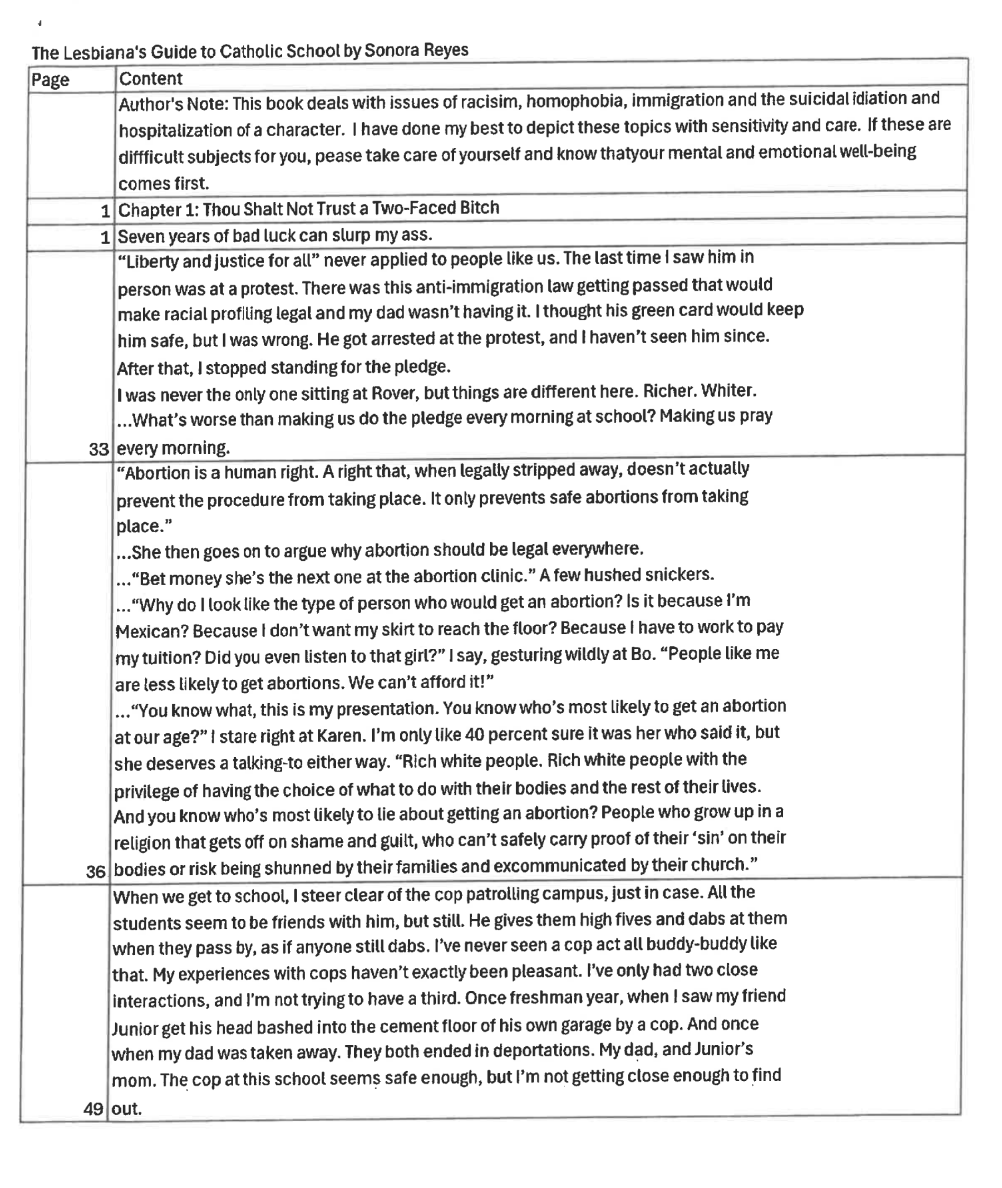 |
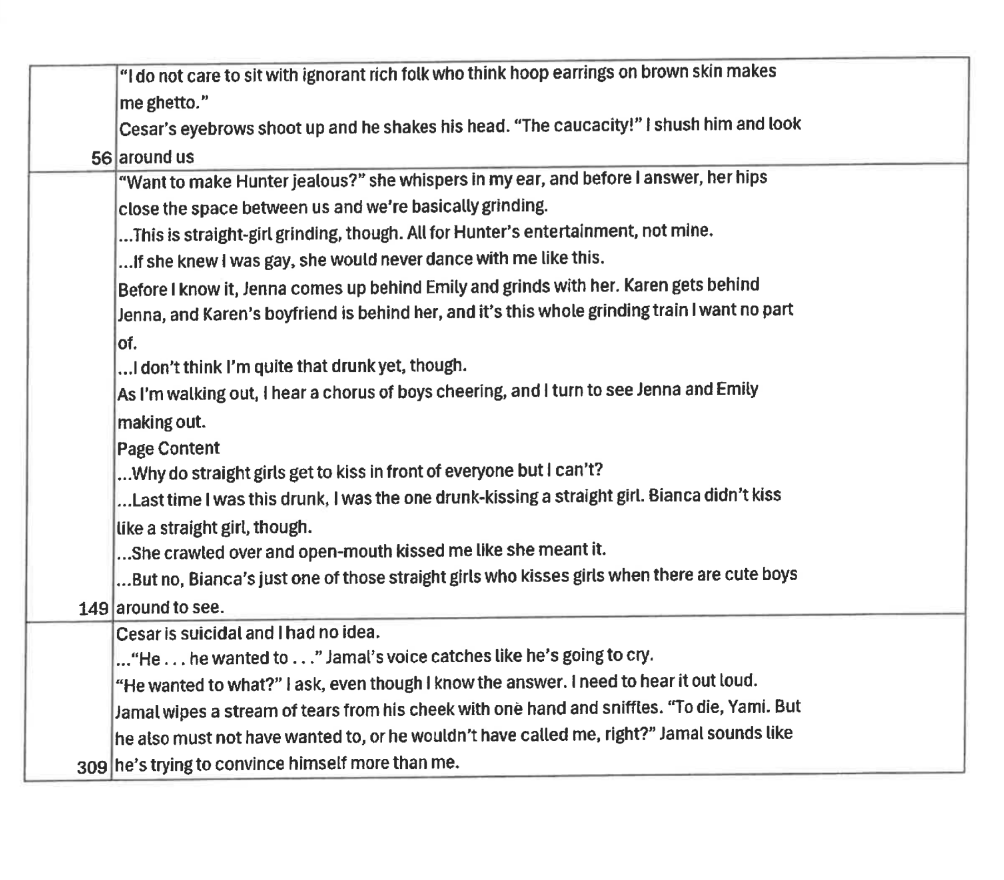 |
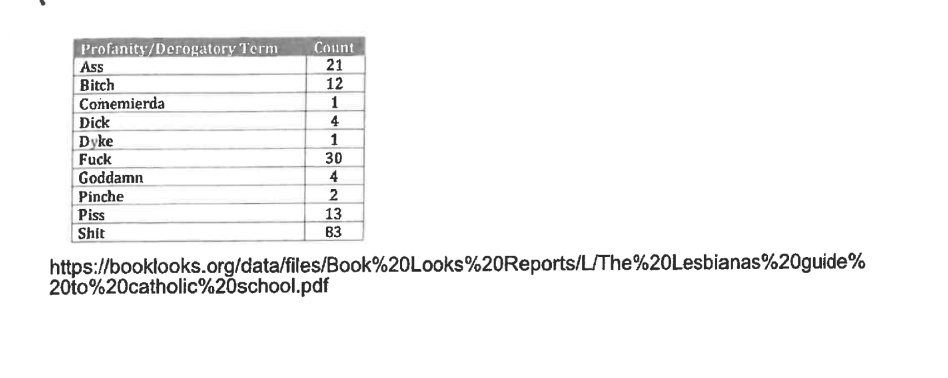 |
If you’re in a library and haven’t updated your challenge policies since 2021, then it’s time to give it some serious consideration. Everyone has the right to petition against materials in a collection they don’t like — that’s a First Amendment right. But they shouldn’t be able to do so by simply copy-pasting the same language and decontextualized passages they can just grab from a website that has the sole purpose of protecting “parental rights” censorship.
Book Censorship News: May 17, 2024
- Read Freely Alabama has filed a First and Fourteenth Amendment lawsuit against Autauga-Prattville Public Library (AL) over book bans. Here’s a short history of this public library’s board pushing for book bans and their firing of the director who refused to give in.
- It was the South Western Board President who had Flamer banned at a Hanover area middle school (PA). Read through everything this board president stands for.
- Clay County (FL), as you noticed above, has been a hotbed for book banning. The board just passed a brand new policy that would flag books with certain content as “mature,” and starting next school year, parents would have some array of opt-in/opt-out forms to choose how their students have access to materials. Recall that these kinds of forms have shown most parents let their students access everything.
- You don’t say? Book banning harms mental health and reduces empathy.
- “Let’s be clear, suspending the gift of reading because of the presence of diverse family structures in a book is not only short-sighted but we, The Ranger staff, find this to be fundamentally wrong. Education is not about shielding students from ideas that some may find uncomfortable or unfamiliar; it is about exposing them to a wide range of perspectives and experiences, helping them navigate the complexities of the world around them.” MORE editorials like this from newspapers, please. This is an excellent read from The Ranger staff — a local college newspaper — about the ending of a partnership between Amarillo Independent School District (TX) and a local organization that provides books to kids in need.
- Letters like this — where it is very clear the parent has no idea how library collections work and believes it is all a conspiracy theory — are why the general public shouldn’t be allowed to make library decisions. It’s done by professionals (& the reason those Christopher Columbus books are probably gone is that they were in terrible condition, and there aren’t yet strong replacements for them). Conspiracy theorist here is against public libraries in Oregon.
- (Paywalled) Despite the majority of books being pulled from Fort Worth Independent School District (TX) being returned to shelves, access to those materials remains a big question mark.
- “The Arkansas State Library Board on Friday voted down two motions to withhold state funding from public libraries that board member Jason Rapert put forth in his ongoing opposition to the presence of certain books on library shelves.” This is a little bit of good news in what is still a pretty crummy situation.
- Alabama’s bill that would criminalize librarians has not passed.
- There’s been a civil rights lawsuit lodged against Cobb County Schools (GA) for banning books.
- “A North Carolina school district is facing a federal civil rights complaint after it ordered books featuring gay parents to be removed from elementary schools.” If you’re counting, that’s three lawsuits in this roundup against school boards that are pulling books they want to discriminate against.
- Make it four, as the educator whose classroom was searched by police following a report that Gender Queer was in it just filed a lawsuit, too. This happened in Massachusetts, as a reminder, because it’s not red vs. blue states.
- Western Sydney Council (Australia) banned same-sex parenting books last week. When the media covered this, and people showed up, guess what happened? Pretty much the opposite of what happens in most cases in America: the banning was overturned. Imagine if this happened here…we wouldn’t be onto our fourth year of this.
- At the Public Library of Enid and Garfield County (OK), a Pride display was disallowed for June in the library, and decisions on the location of several YA books were discussed. One was moved to adult, one will remain in YA, and a pair of other titles will be discussed next meeting.
- “Montana State Library Commissioner Carmen Cuthbertson on Friday compared the Montana Library Association to the Ku Klux Klan, claiming the organization sent an anonymous letter as part of boycotting a meeting.” The state’s largest professional organization for library workers compared to a racist, murderous group of white supremacists.
- Here’s how Boise Public Library (ID) will be implementing the new state laws regarding materials available to minors. It’s…the Miller Test. A reminder that none of the so-called “porn for kids” exists.
- A bill advancing in New Hampshire would allow parents to opt their students out of lessons or curriculum or books or readings about LGBTQ+ people.
- “Courtney Gore, a Granbury ISD school board member [TX], has disavowed the far-right platform she campaigned on after finding no evidence that students were being indoctrinated by the district’s curriculum.” It is a little hard for me to feel sympathy for the folks who bought into this because aren’t they the ones shouting “do your own research?” And now they’re crying that they didn’t? Anyway, no, there’s never been indoctrination in schools in America, despite the claims.
- Montville Borough (PA) decided to withhold its donation to the Lancaster Public Library following its disagreement with a Drag Queen Story Hour in April (that was ultimately canceled because of bomb threats). This week, they’ve reversed their decision and are going to make their annual donation.
- Lawsuits are a theme this week, and this one is VERY important. Yolo County just settled a lawsuit from Moms For Liberty, who claimed their right to free speech was hindered when the library shut down a program from an anti-transgender speaker. The County lost here because they did precisely what Moms For Liberty claimed: hindered free speech. This is a case that should now be used to argue why banning thousands of books across the country is ALSO a violation of free speech. Libraries removing the materials because some people disagree with them is akin to the library shutting down a program because some (a lot of) people disagree with it.
- Pinellas County School Board member Stephanie Meyer (FL) formally challenged Invisible Monsters, which adds to the incredible work she’s doing on the board as a book banner.
- “The North Carolina Values Coalition held a news conference Wednesday in downtown Raleigh calling on lawmakers to create stronger laws to keep certain books out of the hands of children.” Normal behavior here. You’ll be shocked their examples of naughty books happen to be LGBTQ+ books. (Also, whose “values?”)
- St. Charles County Library (MO) may face closures and staff layoffs following a meeting to be held Friday, May 17. This library has dealt with book banning in their adult collection (the “it’s only school books for kids” crowd is full of liars), so disentangling these things is not possible. Of course the story itself is paywalled, but I’ve broken it for you.
- Hanover County Schools (VA) will now make parents and guardians choose from several levels of access their students will have to material in classrooms starting next fall. Remember this county’s long-standing tradition and excitement over book banning.
- A federal appeals court rejected a lawsuit brought to them over whether or not parents could opt their children out of LGBTQ+ books and curriculum in Montgomery County, Maryland. This is good news, but it certainly is a reminder that there are two very different Americas right now: one where people can opt their kids out of learning about other people and one where students actually learn the fullness of humanity.
- A group in Daviss County, Kentucky, continues to show up and complain about books at the local board meeting. This quote is a reminder that they’re achieving their ultimate goal of wasting time and money: “Library Executive Director Erin Waller says heated debates like these have become a monthly occurrence at library meetings after a group calling themselves Daviess County Citizens for Decency demanded a review of about 250 books in the collection.“We pulled them and we reviewed them, and ultimately we kept them in the same collection that they are in,” said Waller.”
- The reason principals and district administrators struggle with finding “reliable reviews” for books being challenged is because that’s not their job to do. It is the job of trained professional library workers–perhaps had those jobs not disappeared and/or every school had one, then this fake panic over learning what’s in books wouldn’t be an issue. This PBS story about the Elkhorn book challenges and similar ones across Wisconsin is meant to be about the challenge of book challenges, but ultimately, it just reemphasizes that library workers are professionals and deserve to be treated, respected, and paid as such.
Source : What Do Book Challenge Forms Look Like?: Book Censorship News, May 17, 2024



